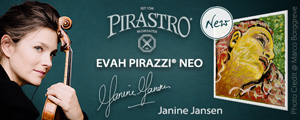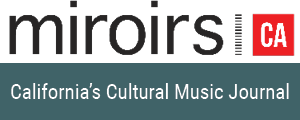We have thousands of human-written stories, discussions, interviews and reviews from today through the past 20+ years. Find them here:
Writing String Quartets at Native Maestro Composition Academy
My name is Alana Chirinos, and I am a 13-year-old 9th-grade vocal major at Classen School of Advanced Studies High School at Northeast, in Oklahoma City.
I want to tell you about an unforgettable experience I had last month at a weeklong composition camp called Native Maestro Composition Academy, led by the composer Jerod Impichchaachaaha' Tate. At the camp, we each composed several pieces, and we learned so much about music in the process. At the final concert, our pieces were performed by the Dover Quartet, which was an amazing honor. (The Dover Quartet has played music by our teacher, Mr. Tate, and he invited them to work with us.)

Students of the 2025 Native Maestro Composition Academy, with composer Jerod Impichchaachaaha' Tate and the Dover Quartet, at the final performance of their works on June 7.
First I'll tell you a little bit about myself. My musical studies began when I was eight years old. What inspired me to start making music was primarily my mom. She always sang to me, and she told me that I could sing, before I could talk! So I originally started singing, then I added instruments to accompany me, such as the guitar and violin, which I played in middle school with my orchestra.
However, at this point my main instrument is the piano, which I’ve been playing for six years. At home we have an electric piano, and when my brother started taking lessons and playing on it, I got curious. I toyed around with the keyboard, and next thing you know, I was taking lessons. I continued with these lessons because I realized that playing the piano made me happy, and since then I have completely fallen in love with it.
When was around nine years old, I started composing so I could create songs and connect with music. When I found out that my mom had signed me up for the Native Maestro Composition Academy, I was overjoyed. It was an opportunity to learn more about music, composition, and the way it all works together.
This year there were a total of nine students in the camp, ranging from ages 11 through 15. The camp was held at the First Americans Museum in Oklahoma City and it ran from June 2-6, with a final concert on June 7 that featured the Dover Quartet performing our compositions.
In class, each of us had our own space and keyboard. We wrote mainly by hand, on staff paper, and this year I also used a software program called Musescore. A couple of the kids (like me) had been at the Academy the year before, and the other ones were brand new.
Our teacher, Mr. Tate, is brilliant, and he knows how to make the classes fun. We were always excited to enter the room each morning because we felt welcomed. But I don’t like Mr. Tate just because he’s fun; I like him because he knows music. He knows how to create any idea he has in his head. I built a friendship with him and he is one of my biggest role models. Every morning we would gather around him, and he would explain what we were going to do for the day. Then he would send us to our work stations so we could continue working on our pieces.
And as I mentioned, Mr. Tate kept things fun. Whenever we had a break, we played with the toys that Mr. Tate bought for us: yoyos, sticky balls, and other trinkets. Sometimes we’d also go down to the museum to walk around.
When we were working, he’d go to each of us and look over our pieces to give advice or answer questions. Mr. Tate encouraged us to find the structural pattern of the piece, and the corrections that he gave to me about notation and rhythm are ideas I will always remember. I received a lot of advice that will help me in the long run.
What surprised me most is how precise you have to be when composing. If you aren’t precise and cautious, your piece won’t make sense. The biggest mistake I made this year was to continue writing without checking for mistakes - more on that later!
This year I composed three pieces of music: "Can You Really Go Back in Time?" "The Agreement," and "When I Die, My Love Does Not." Here is the video recording of the Dover Quartet, performing my pieces at the final concert:
The first piece, "Can You Really Go Back in Time?" was inspired by one of my original songs that I had written for piano. I decided to use it for a string quartet because I thought it would fit perfectly - and it did! The second piece, "The Agreement," represents a quarrel between the instruments, but once they come together, they agree. The third piece, "When I Die, My Love Does Not," is a piece about love and how it will never fade.
The final day of camp, on Saturday, the Dover Quartet interpreted all our pieces. Before the performance, when they were going over my pieces, I realized that I had made mistakes on notations and rhythms on one of them. I was afraid I might have to make a change in the music last minute or that it wouldn’t make musical sense. But thankfully, we were able to fix it!
I was nervous and excited that my pieces were going to be played in front of friends and families who were in the audience to support us. The Dover Quartet really brought our pieces to life, and in the end, they sounded even better than I thought. Even though I already knew my music in my mind, listening to them play it gave me goosebumps. The feeling of accomplishment is hard to describe.
I can tell that each of us felt proud about our creations, and having the support of our families at the concert felt important.
I am so grateful for my experience at the Composition Academy - it will forever leave a mark on me. I’ve made friends and learned many things. Each of us students felt music in different ways, but at the end of the day, we all connected with it, and that's what brought us together. This was a special atmosphere because we could always ask each other anything about our music, without judgment. It was a safe space, where I could learn to express myself with music and toy around with my creativity.
You might also like:
- Interview: Chickasaw Composer Jerod Tate's 'MoonStrike' Hits Carnegie Hall
- Joel Link Appointed Concertmaster of the Cleveland Orchestra; Dover Quartet to Stay Together
- On-the-Spot Film Scoring with the Digital Natives
* * *
Enjoying Violinist.com? Click here to sign up for our free, bi-weekly email newsletter. And if you've already signed up, please invite your friends! Thank you.
Replies
What an amazing experience! Thank you for sharing. Your compositions are lovely and I look forward to hearing more from you in the future.
Thanks Alana,
These kids are obviously very talented. I can tell you’ve worked very hard to produce an excellent recording.
Are the kids moving on toward careers in music?
Alana, thank you so much for sharing your experience! I think it is wonderful that you are learning to write music that other people can play. While it is fun and often useful to make beats with the tools and technology that we have today, there is a special art in writing music that people can re-create in person with instruments and/or their own voices. Making live music together is one of the most fun, unifying (and unharmful!) things that we humans are capable of doing together! So writing a piece of music that brings people together - it's a great thing to learn how to do. Kudos to Jerod for putting together a program that felt like a safe place to create together and share your work. And to work with the Dover Quartet, what a treat!
Alana, I am so, so proud of your work and feel privileged to be your composition teacher!!
This article has been archived and is no longer accepting comments.














July 4, 2025 at 07:24 AM · Congratulations Alana! Your report is very interesting and I enjoyed your compositions, which were so well played by the Dover Quartet.